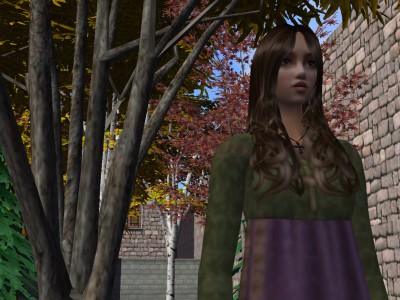
Maud rushed through the gate and stood quivering in the garden.
She could only come to this small garden inside the wall, for the little door through which she used to pass to go into the woods beyond was locked now, and when they had tried to open it for her, they had found it firmly stuck. So much time had passed since she had gone away.
It seemed as if her girlhood must lie behind it—if only she could get through. On the first morning after they had found it unmovable, she had gone out through the great gates and walked around the wall… but it wasn’t the same. She could not reach her girlhood that way, and so she could not reach her girlhood at all.

Instead she came into this small, overgrown garden where, it was said, the bones of the Welsh priest who had founded the abbey were buried. In the summer it was a place of pilgrimage, but in the autumn she was certain to be alone.
She liked her gardens overgrown, but she thought this one had grown too far, especially since her departure. The trees had been allowed to grow up within it, and outside the wall as well, though once the place had been as defendable as a fort. And beneath the trees, where little sunlight fell—where little sunlight would have fallen anyway, in the shadow of the wall and of the guest house—there grew mostly moss, and a few stringy ferns, and a scattering of miserable and frost-bitten flowers.

Still, she ran here in the mornings, often long before the first rays of sunlight had topped the wall, for even this mossy gloom was a relief after the dark anguish of the nights she spent at the abbey. She had come looking for peace, and instead had found only a harrowing of the soul.
She had been looking forward to this retreat for months. As difficult as it had been for her to leave her children, she had thought it would be a relief. Here she would have to smile for no one. She would not need to think of what anyone else would like, or bend her will to another’s, or endure… anything. Her days would not be the trials of endurance they were at home.

And in the nights she would not have to endure the touch of the impossibly square hands of the square-shouldered, square-jawed man who had married her. She could sleep alone again, like a girl…
But she could not sleep. As tired as she felt when she left her uncle’s fireside, her eyes were wide and staring as soon as she stepped into the dark of her narrow room.
For there in the dark was a presence she could not see. She could not see, but she could hear its voice, and it accused her. She had come to do penance, it reminded her, but she had come to it as to a respite—not because she was truly repentant, and gloried in giving herself over to her atonement, but because she had twisted her penance into yet another sin. She wondered now with what penance she could crown this.
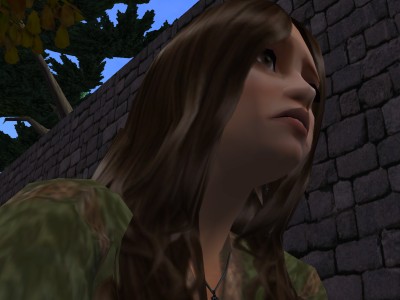
This morning she walked from wall to wall, twisting her fingers, too overwrought, exhausted, and hungry to pray silently or even finger her beads. She had begun to feel as if she might die soon—there would be no peace for her in life, she saw now—but there was nothing she feared more, for she knew her soul to be as black as sackcloth, and she did not yet know how to clear it, if even in trying to do penance she only sunk deeper into sin.
She was what was called a fallen woman. It was only now that she understood what that meant. She had fallen as surely as Lucifer himself had fallen, and there was no climbing back up from these depths. She was like a little star, who had once had its place in the heavens, but who had fallen, and who would never—
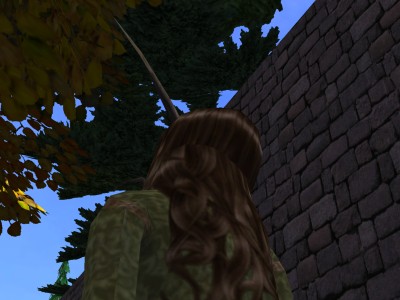
She looked up, for a rustle in the tree above her almost made her believe for a moment that she heard a star falling from the sky. But it was not a star.
It was a man. A dark man who leapt like a cat from the tree. A man who—
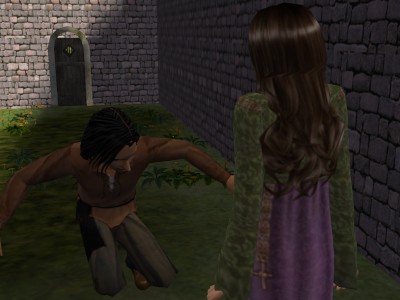
Before she could connect the thoughts in her troubled mind, the man had a hand over her mouth, and one arm around her, and was dragging her into the corner where the guest house met the wall. He held her there, with a hand still over her mouth, and whispered, “I know you must keep silent. You shall no speak. You shall do no wrong.”
He watched her warily for a moment, and then lifted the hand from her mouth. She only stared at him, her heart throbbing so that her body shook with it. It was Malcolm, it was Malcolm. He had fallen from the sky like Lucifer.
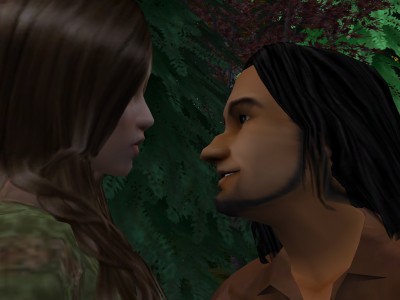
“You do no wrong,” he whispered, and kissed her suddenly. He kissed her as if he would devour her.
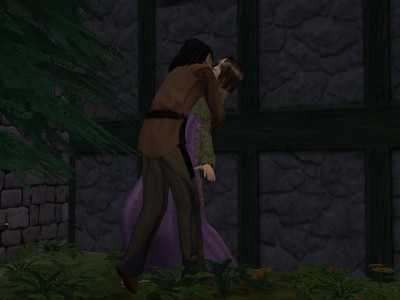
Horrified as she was, her senses cried out in joy at the familiarity of him. This was the mouth she knew—the lips, the tongue, the beard, the nose that was pressing into her cheek, the breath, the silky hair that fell over their faces. Her body had not forgotten his.
He was growling in his throat like a wolf when he breathed—or perhaps he was speaking to her in Gaelic, it could sound much the same to her. She was growing dizzy; no matter which way she turned her head, his mouth followed her own.

“You do no wrong,” he repeated between kisses. “You only walked in your dear garden, and the man came over the wall, and would no let you cry out, and would no let you go.”
It was a test, she thought. Had not the Lord been tempted in a garden? But the man would not let her cry out, and would not let her go, and she could not tell whether she was fighting him or not. There was so little she could do in any case—but did she even try?
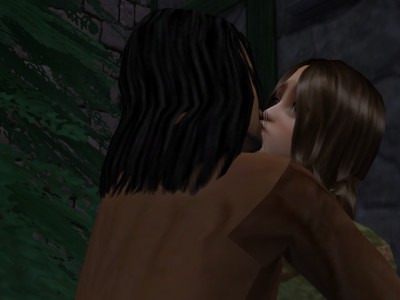
He began stroking her hair roughly on her head and on the back of her neck, and he pressed his cheek against her hot forehead and began murmuring to her in Gaelic.
Where were her hands? She found them upon his chest. She slid them up to his shoulders and around his back, and soon she hung with her arms around his neck, the length of her body along the length of his. She had failed. She began to sob silently.

“Whisht! Whisht! I only wanted to look at you. You have done no wrong.”
She was not sure what language he was speaking. Nothing made sense in any case.
He stepped away from her and took her shaking hands in his. He kissed them both, but she pulled them away from him and held them against her face. Now they two were not touching at all.
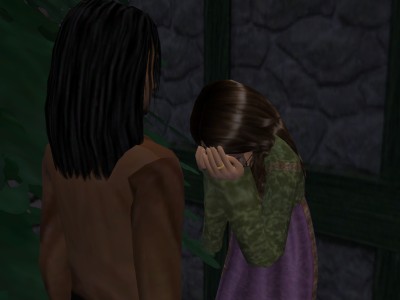
She heaved with painful, silent sobs, as if her body meant to expel her own poisonous soul. She was damned, and after her death, she knew that her every moment would only feel worse than this.
The world had gone black, and it took a great effort of mind for her to realize that it was because she held her hands before her eyes. When she pulled them away, she found him gone.

She made a sound at last—a sickening, animal-like wail—and stumbled forward, her hands groping the air for a sign of him.

It was as if he had never been. But it didn’t matter. Real or not, he had shown her how surely she was damned.
She pitched forward onto the moss and lay curled up around the poisonous soul that burned at her core, wracked with loud sobs that rang against the high walls.
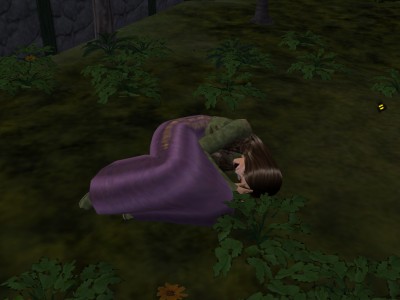






She is someone I pity and dislike at the same time. Just like Elfleda.